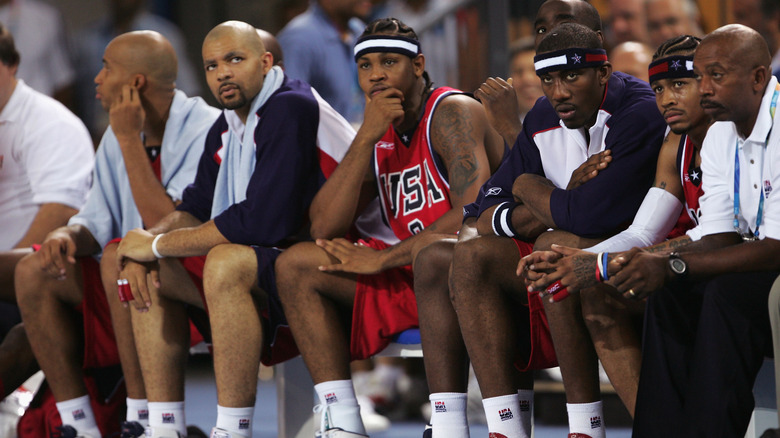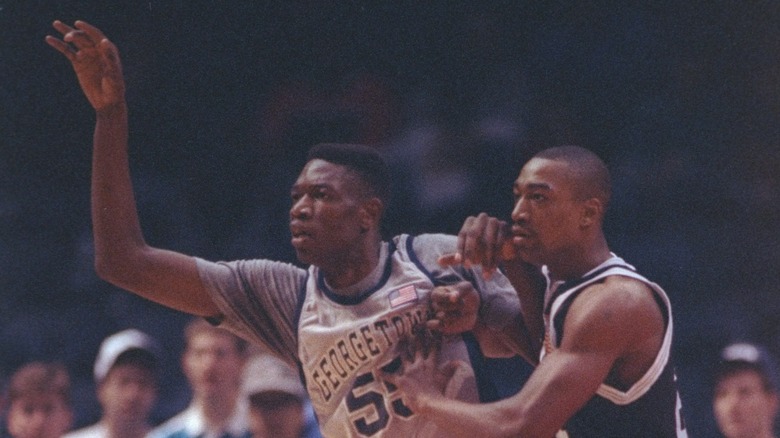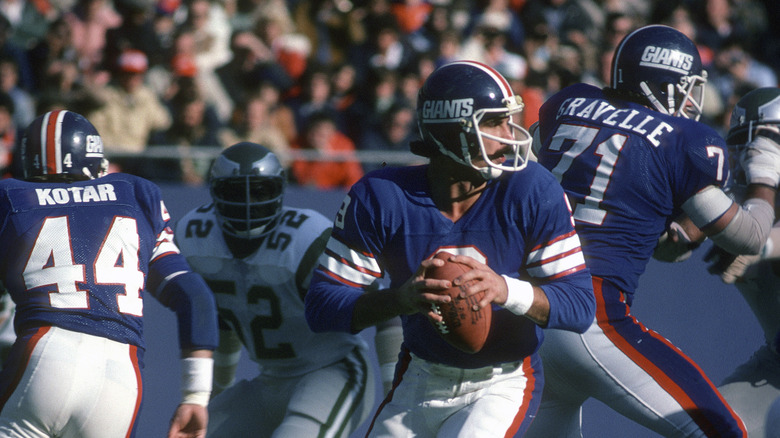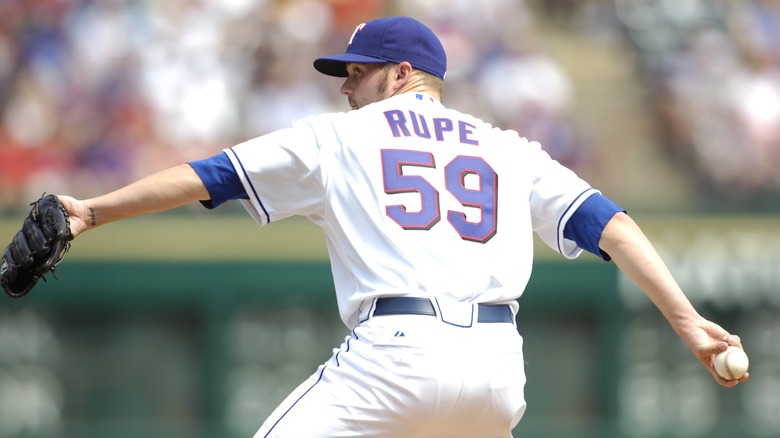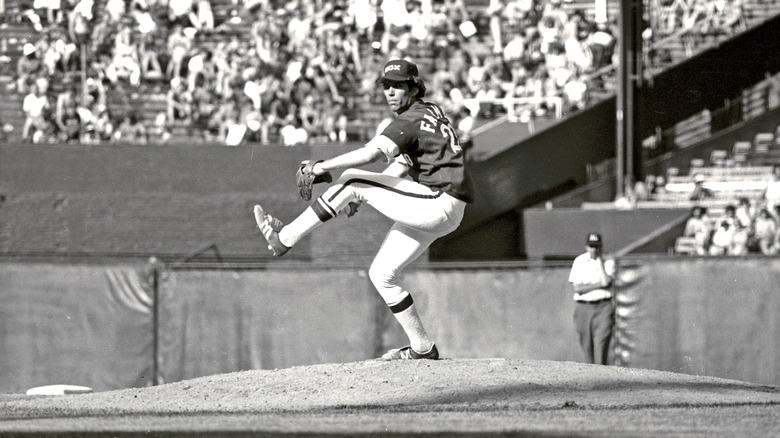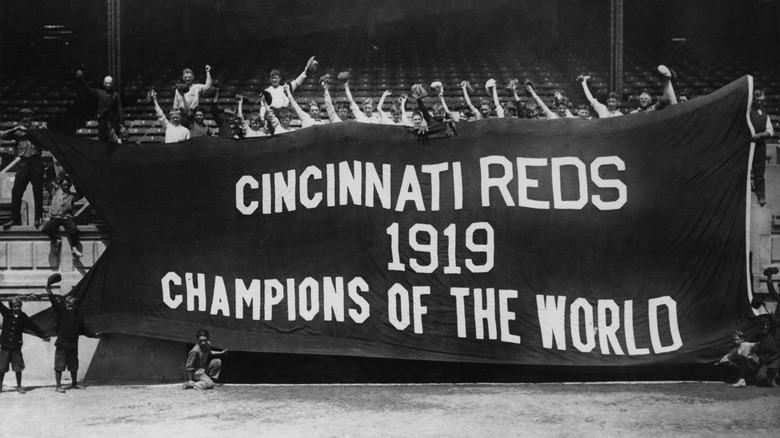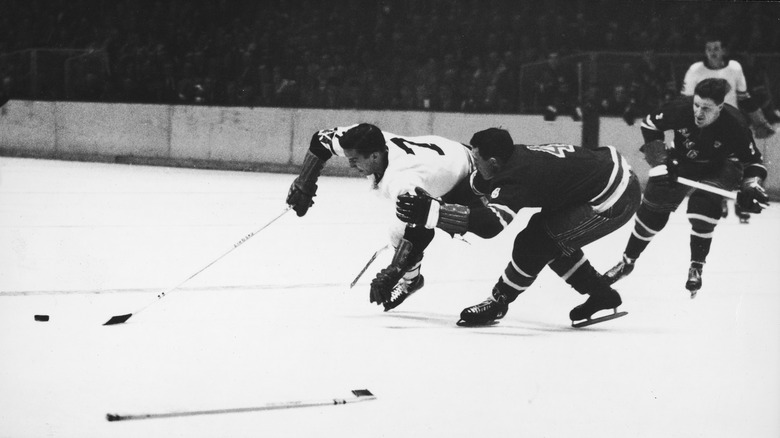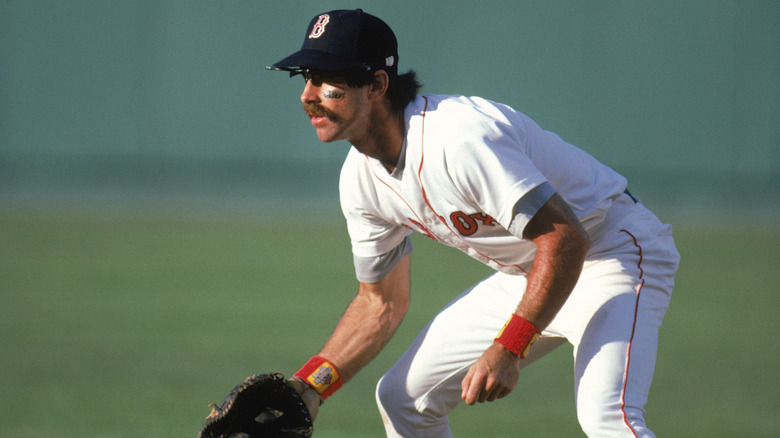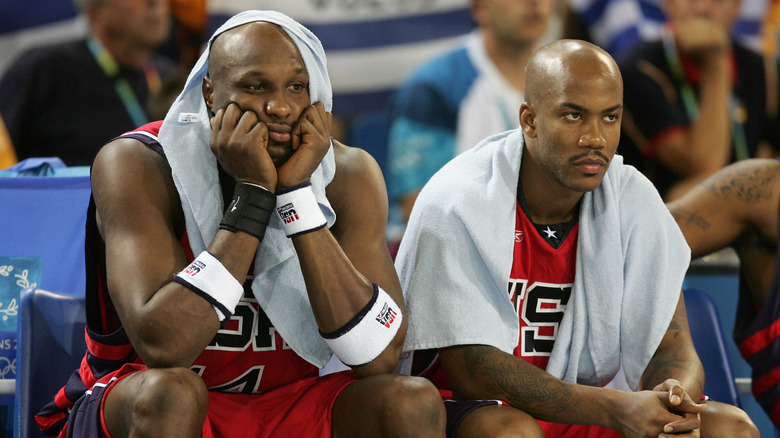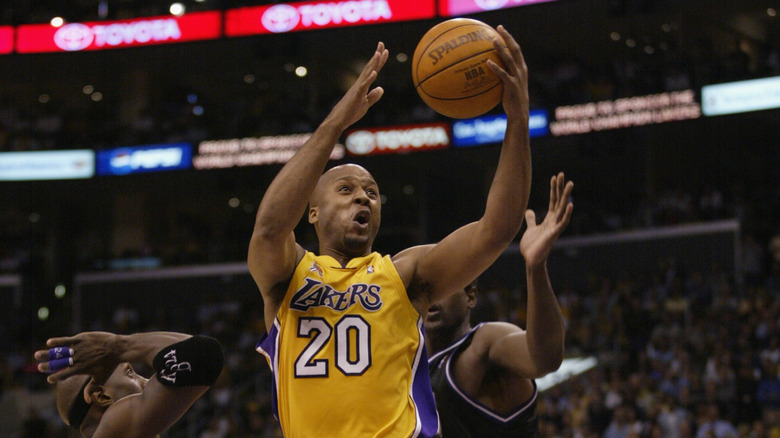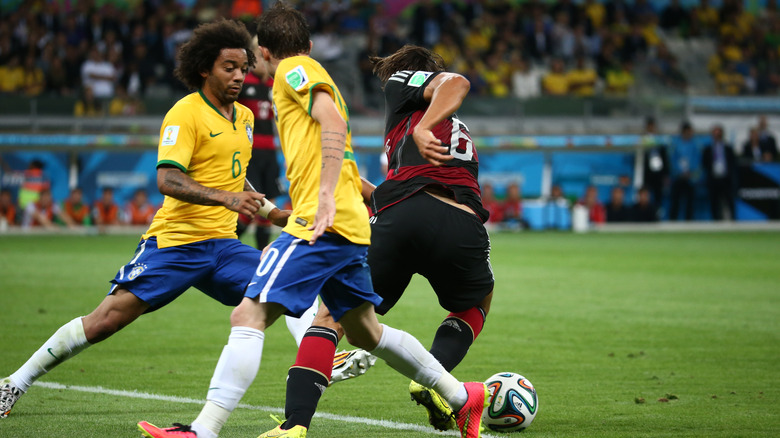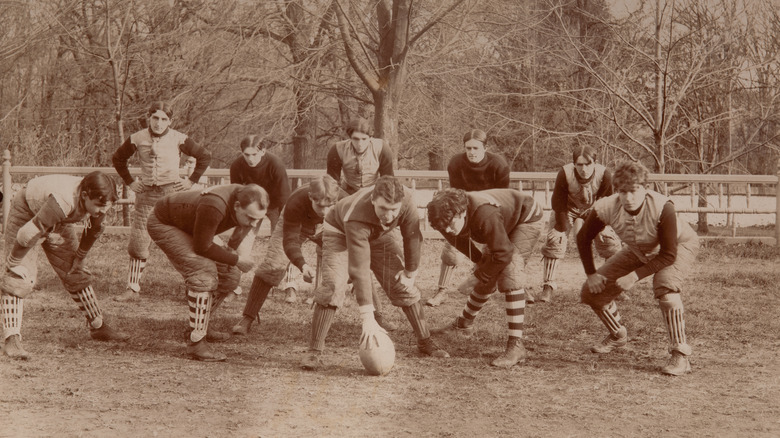The Biggest Losses In Sports History
From crowd-rousing underdog triumphs to teams that overcame devastating setbacks and worked themselves to the bone to become champions, the history of sports is filled with stories that'll put goosebumps on your arms and tears in your eyes. The flip side to that, though, is the embarrassed losing side. For every athlete or team that lifts the trophy over their heads and gets a movie made about their improbable win, there's a humiliated loser that either thought they had the game in the bag and has to spend the rest of their life answering questions about what the hell happened, or at least didn't think they'd lose quite so badly. Sometimes, defeat comes down to a single moment that can change everything from that one game to the future of a franchise. Sometimes, no one single moment could possibly salvage a slaughter of historic proportions, that's destined for snarky listicles decades in the future.
From Tim Duncan, Allen Iverson, and LeBron James getting clobbered by no-name Puerto Rican basketballers at the 2004 Olympics, to the White Sox throwing a World Series for money, to the Rangers saturation bombing the Orioles 30-3, the following blowouts and bloopers make up the most embarrassing, cringeworthy, shocking, hilarious, all-around biggest losses in sports history.
Villanova's upset win over Georgetown
In 1985, everything seemed to be working for the Georgetown Hoyas, who were on the cusp of a second consecutive NCAA Division I Men's Basketball Tournament win. The only thing between the East region's first-seed team and another victory was the Villanova Wildcats — eighth seed from the Southeast.
Writing for Sports Illustrated, Tim Layden says "the perfect game" produced one of the most legendary upsets in the history of college basketball. The game was nail-bitingly close almost the entire time, with Georgetown unexpectedly struggling but still the favorites to win, with a slight lead heading into the buzzer. But with 2:37 left on the clock, Villanova sophomore Harold Jensen made what Layden describes as "the most important shot in Villanova history" to seize a paper-thin 55-54 lead. They kept the lead and won the game, 66-64, dashing at the last minute the hopes of both the Hoyas and Carl from Customer Retention, who really thought he was going to win the NCAA bracket office pool that year.
The victory that turned the Wildcats into underdog legends changed lives and became the go-to story for coaches everywhere, trying to inspire their team in the face of impossible odds. "[T]hat tournament was a turning point in my life beyond the sport," Jensen, who later formed a successful marketing company, told Sports Illustrated. "It taught me to believe in myself." It's also probably something Georgetown fans can't stand watching people get teary-eyed over.
Miracle at the Meadowlands
The term "Miracle" frames what happened during the Giants-Eagles game in 1978 through the lens of Philadelphia's improbable 11th hour victory. But this is a list of worst defeats, so we'll swap out "Miracle" for "Mishap" or "Mistake," or some other "M" word synonymous with "humiliating blooper that wastes a surefire win." Although it is also referred to as "The Fumble," so we'll just go with that.
Running out the clock when you're ahead is something pretty much every team does in every sport. It's not a below-the-belt tactic to get possession of the ball and dawdle until you hear the buzzer. Why give the other side a chance to score at the last minute? In other words, why be Giants quarterback Joe Pisarcik, who Sports Illustrated says inexplicably tried to hand off the football to fullback Larry Csonka in the final seconds of the game, only to fumble it and allow Eagles cornerback (and current Arizona State coach) Herman Edwards to recover it and run it to the endzone for a last-second, 19-17 win at Giants Stadium? Don't be Joe.
Weirdly, it ended up benefiting the Giants more in the long run. The Sports Illustrated article describes how the whole stadium sat frozen in shock after Edwards' touchdown, but also how the embarrassed Giants, reeling from what just might be the most infamous fumble in NFL history, reshuffled the team and soon transformed themselves into a Super Bowl dynasty.
The Rangers annihilate the Orioles 30-3
Sports Illustrated has the following facts on the 30-3 clobbering the Baltimore Orioles suffered at the hands of the Texas Rangers in 2007. First, it was the first time any team had reached 30 runs since 1897. Not 1997, which would've been notable enough — but 1897, during the William McKinley administration. Remember that guy? No, because everyone who did is dead.
All 10 Rangers who batted scored at least one run. Five got at least three hits (producing a team-wide batting average for the game of .509). Two Rangers — Jarrod Saltalamacchia and Ramon Vazquez (who the article says had only scored 22 home runs in 9 seasons) — got two home runs, opening the door to seven total runs for their team – each. That includes three grand slams in a single game. You get the point, and we've almost run out of ways to describe how severe the beating was.
Thing is, nobody expected it. The Rangers weren't having the best season. The article says they'd long since given up hope of making the playoffs and had only scored 14 runs in the last week. Thanks to numerous trades and players being out for medical reasons, the Rangers' lineup that went into the double-header with the Orioles was such a confusing, sloppily thrown together group that nobody, least of all Texas, expected the sun to shine on them so soon, or so bright. So chin up, folks. You never know when your fortunes will turn around.
The White Sox lose because they blew up disco records
Quick, the White Sox need your help driving up lackluster ticket sales. If your solution is "invite folks to watch disco records get blown up on the diamond between games at a double header," you might just be disc jockey Steve Dahl or team owner Bill Veeck. In which case, hey Bill and/or Steve! Sorry "Disco Demolition Night" turned into such a mess. If you're not Steve or Bill, here's what happened at Comiskey Park on July 12, 1979, according to Rolling Stone.
Ticket attendance indeed soared as White Sox and Tigers fans were joined by disco-haters, with and without tickets, excited to help stop disco from Staying Alive long enough to limp into the '80s. There were so many people, in fact, that not only did the explosion itself turn dangerous, but drunken fans rushed the field, tossing beer bottles and firecrackers. Police soon showed up to stop what had become a full-blown riot. The article says it was a cathartic moment for rock fans who wanted revenge for disco's recent domination of pop charts (and presumably for KISS recording a disco tune to stay relevant). For some minority groups, though, the riot had a chilling message: Your music and culture is not welcome here.
Oh, sorry — you might be wondering why this entry is on the list. The madness was so intense that the second game was called off, forcing the White Sox to forfeit to the Tigers. Whoops.
The White Sox throw a World Series game
Try to imagine what it must be like to watch your favorite team reach the World Series, only for them to get slaughtered, and have it be revealed that some of your idols had allegedly accepted a bribe to throw the game. Now imagine that was the one time your team would have a shot at the World Series until 1959. If you're a White Sox fan, you understand this pain. (Well, maybe your grandpa did. But you get the point.) This is exactly what happened in 1919, when several players formed a conspiracy to dive in the World Series, in exchange for $100,000 (no small sum at the time).
History reports that while gamblers and ballplayers had struck illicit deals in the past, fixing a World Series was considered unimaginable. Shock, then suspicion, followed the White Sox's unexpected 9-1 blowout defeat against the underdog Cincinnati Reds in Game 1. Five games in, the Reds had triumphed in four games. After the crooks they'd done business with had failed to pay up, however (the divers were expecting installments after each defeat), the Sox decided to toss the fix and won the next two games. However, they lost the final game and the Series to the Reds.
Rumors of a fix persisted for months, until a grand jury was convened to investigate. The implicated "Black Sox" were acquitted, but all eight were banned from the league for the rest of their lives.
The Red Wings smash the Rangers, 15-0
How bad a 15-0 defeat is depends on what sport you're playing. In American football, for example, it just means one side got two touchdowns and a field goal. But ice hockey, where the goalie is almost as big as the net, is a sport that's notoriously hard to score in. That's why everyone goes nuts whenever someone gets a point.
So a 15-0 defeat in ice hockey, like the one the Detroit Red Wings dealt the New York Rangers in January 1944, is an absolute shutout. ESPN has the details on the embarrassing/triumphant (depending on which team you were rooting for, assuming you're at least in your 80s) game. In his defense, Rangers goalie Ken McAuley did manage to make 43 saves throughout the game, which is certainly far more than the number of saves most of the armchair quarterbacks (armchair goalies?) who've criticized him in the years since could've made. But he let 15 shots in and, well, yikes. There's just no way to spin a drubbing that bad.
But it wasn't just his fault. His whole team was having an off night (to say the least) while the Red Wings were on the ball. This is evidenced by the fact that while the Red Wings made 58 shots on goal, with 10 players getting at least one point, the Rangers only made nine shots — every one of which was successfully blocked by rookie Red Wings goalie Connie Dion.
Bill Buckner blows it for Boston
The MLB describes the "Curse of the Bambino:" a widespread superstitious belief that the controversial decision by the Red Sox to trade slugger Babe Ruth to the Yankees in 1919 had killed the team's championship fortunes for 86 years, until they won the 2004 World Series. Boston did manage to reach the World Series four times during this period, as the article describes, in 1946, 1967, 1975, and 1986. But victory was always snatched away at the last second.
In the midst of all that heartbreak, though, the 1986 defeat at the hands of the Mets, made possible by a ball rolling through the legs of first baseman Bill Buckner, might be the most traumatizing. In fact, it was that particular loss that the article says led to the Bambino Curse being named.
History has more details on Buckner's infamous error, which took place in the 10th inning of the then-tied sixth game of the Series. The Mets scored as a result, leading to a seventh game that they won. So you'd be correct in saying Boston's '86 Pennant defeat wasn't entirely Buckner's fault. But if he hadn't literally dropped (or missed) the ball, the "curse" might've ended right then and there with a Boston victory that was, yet again, so torturously close. So, perhaps unfairly, he gets all the blame. "I can't remember the last time I missed a ball like that," the poor guy later said. "But I'll remember this one."
Puerto Rico beats the US Olympic Basketball team
Quick, who would win the following pickup game? Team 1, with Tim Duncan, Allen Iverson, and Stephon Marbury, all in their prime, alongside young LeBron James, Dwyane Wade, and Carmelo Anthony? Or Team 2: a bunch of nobodies from Puerto Rico? If you selected Team 2, you're either insane, or you know we're talking about their shocking upset victory over the U.S. men's basketball team at the 2004 Summer Olympics in Athens. And it wasn't even that close of a game: FIBA says the final score was 92-73.
It wasn't a fluke, either. There are two reasons for that. First, the article describes how despite its murderers row of basketball superstars and a fantastic staff including head coach Larry Brown and assistant coaches Gregg Popovich, Roy Williams, and Oliver Purnell, the U.S. Men's National Team had been seriously struggling. In fact, they barely reached the podium that year at all, following further losses to Lithuania and Argentina. The defeat to Puerto Rico, led by excellent point guard Carlos Arroyo, was only the first blow at the games, and therefore the most surprising and noteable.
The second reason? It wasn't the only time a star-studded U.S. Men's National Team would get its stuff rocked by nobodies from a country that has no business challenging the U.S. in basketball. (What do they think this is, soccer?) The same site says Greece smacked a USA team in 2006 that also included LeBron, Carmelo, and Dwyane.
A 1-point loss cost the Sacramento Kings everything
Double- or triple-digit blowouts are obviously humiliating for the losing side, but losing a close game against a rival at the last possible second — especially an NBA finals game — can be just as devastating, if not more. Worse still, such a deflating loss can set an entire franchise on a downward spiral from which there is no coming back.
This is the exact scenario the Sacramento Kings found themselves in during the 2001-02 Western Conference finals, which pitted them against the Los Angeles Lakers. Unless you don't follow sports or have been in a coma for 20 years, you know which of these two teams would go on to dominate the NBA in the 21st century like no one else. NBC interviewed NBA official Tim Donaghy, who says that the Kings' one-point defeat in Game 6 (100-99) ruined their momentum and cost them Game 7, which in turn led to a string of failures and ultimately, to the Kings leaving Sacramento. It was that specific moment that altered the future of an entire championship-bound team for the worst.
Worse still, Donaghy argues that the game was effectively rigged due to controversial officiating from the refs. "There's no doubt in my mind that the Sacramento Kings should have a ring on their finger," he said, saying the Kings got "robbed" and arguing that bad calls ultimately threw the game to Los Angeles. As the article notes, Donaghy is far from alone.
Germany smashes Brazil at the 2014 World Cup Semifinals
Nobody likes it when their team loses, especially to a rival in a championship game. But not even the most diehard fanatics in the U.S. can relate to what Brazil endured following its humiliating World Cup Semifinal trouncing at the hands of Germany in 2014. Soccer is a major cornerstone of Brazilian culture (as it is in much of the world), making each World Cup an essential moment and an opportunity to unite the country and earn prestige on the world stage. To put yet more pressure on Brazil's team, they were hosting that year. Failure to at least get respectably close to a sixth World Cup victory was unacceptable. And they did at least reach the semifinals. But then it fell apart.
Bleacher Report has details on what went so horribly wrong. First, two Brazilian stars, forward Neymar and captain/center-back Thiago Silva, were out of the game (due to an injury and penalties, respectively). But even with their absences, the world was shocked when Germany scored an astonishing five goals before 30 minutes had even passed. Throughout the match, Brazil struggled to maintain possession of the ball. And as Germany kept notching goals, cohesion and morale plummeted. Jeers and boos from an embarrassed, infuriated crowd certainly did no favors. Brazil did manage to score once, at the 90-minute mark, but by that point it was a token victory in an otherwise catastrophic blow to Brazil's national pride.
Georgia Tech demolishes Cumberland 222-0 in 1916
No, that is not a typo. A score of 22-zip would've been bad enough. In fact, that exact score was what set the stage for this infamous, tenfold slaughter. In Spring 1915, Cumberland demolished Georgia Tech's baseball team 22-0, in a match that allegedly involved Cumberland illegally filling their roster with professional players. The NCAA says this was never proven, but Georgia Tech still wanted revenge, and planned to exact it on the football field the following year. Although Cumberland discontinued its football program in 1916, they had already committed to facing Georgia Tech on October 7, and would've faced a $3,000 penalty (roughly $81,000 today, according to Dollar Times) if they didn't show.
The resulting carpet bombing of 222 to a big fat goose egg is the biggest score discrepancy in the history of football, college or otherwise. In an article discussing the 100th anniversary of the blowout, ESPN says the NCAA didn't actually start keeping records until 1937, so the game isn't officially on the books. But that was likely a small comfort to the traumatized losing side, which failed to gain even a single first down, fumbled the ball nine times, and suffered six interceptions. Meanwhile, the Georgia Tech Yellow Jackets scored 63 points in each of the first two quarters, 54 after the half, and finished with another 42 points in the last quarter. Imagine being 126 points down and realizing the game, and your suffering, is only halfway over. Good lord.
